超全的英语介词用法归纳总结
40个英语介词用法总结
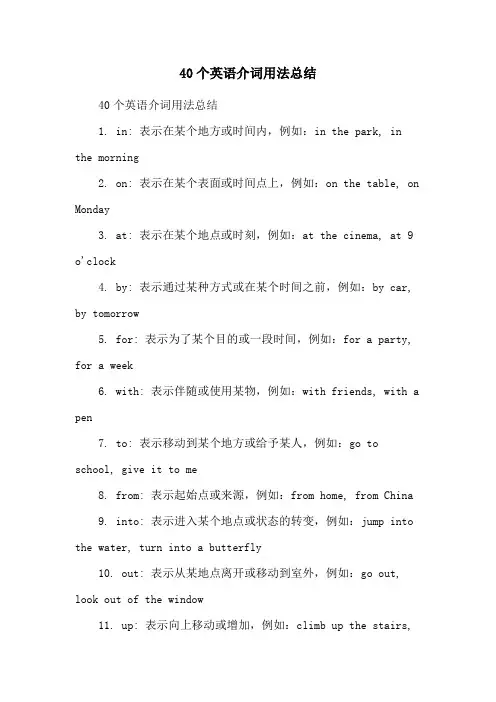
40个英语介词用法总结40个英语介词用法总结1. in: 表示在某个地方或时间内,例如:in the park, in the morning2. on: 表示在某个表面或时间点上,例如:on the table, on Monday3. at: 表示在某个地点或时刻,例如:at the cinema, at 9 o'clock4. by: 表示通过某种方式或在某个时间之前,例如:by car, by tomorrow5. for: 表示为了某个目的或一段时间,例如:for a party, for a week6. with: 表示伴随或使用某物,例如:with friends, with a pen7. to: 表示移动到某个地方或给予某人,例如:go to school, give it to me8. from: 表示起始点或来源,例如:from home, from China9. into: 表示进入某个地点或状态的转变,例如:jump into the water, turn into a butterfly10. out: 表示从某地点离开或移动到室外,例如:go out, look out of the window11. up: 表示向上移动或增加,例如:climb up the stairs,wake up12. down: 表示向下移动或减少,例如:walk down the hill, calm down13. about: 表示关于某事或在某个范围内,例如:talk about the movie, wander about the city14. off: 表示离开或关闭,例如:get off the bus, turnoff the lights15. on: 表示打开或激活,例如:turn on the TV, switch on the computer16. over: 表示越过或在某地上方,例如:jump over the fence, fly over the city17. under: 表示在某物下面或被控制或影响,例如:hide under the bed, live under his rules18. with: 表示具有某种特征或和某人一起做某事,例如:a man with blue eyes, dance with me19. without: 表示没有某物或在缺乏某物的情况下,例如:go without food, live without regret20. by: 表示通过某种方式,例如:learn by doing, go by bus21. through: 表示穿过某物或完成某事,例如:walk through the door, go through the documents22. across: 表示横穿某物或在某个范围内,例如:swimacross the river, all across the world23. between: 表示在两个事物之间或在某个时间段,例如:choose between two options, between 9 and 10 o'clock24. among: 表示在三个或三个以上事物之间或在某群人中,例如:share among friends, discuss among colleagues25. around: 表示在周围或在某个时间点附近,例如:walk around the park, around midnight26. through: 表示通过某事物或在某段时间内,例如:read through the book, work through the night27. against: 表示反对或靠在某物上,例如:fight against injustice, lean against the wall28. for: 表示代表或支持某人或某事,例如:vote for a candidate, fight for freedom29. towards: 表示朝向某个方向或对某人有好感,例如:walk towards the beach, feel towards someone30. within: 表示在某个时间或范围内,例如:arrive within an hour, within the city limits31. beyond: 表示超出某个界限或超过某个程度,例如:beyond expectations, beyond the horizon32. along: 表示沿着某个路线或伴随某人一起,例如:walk along the street, sing along with the song33. above: 表示在某物之上或高于某个程度,例如:flyabove the clouds, above average34. below: 表示在某物之下或低于某个程度,例如:swim below the surface, below freezing35. beside: 表示在某物旁边或和某人一起,例如:sit beside me, beside the lake36. near: 表示在某物附近或接近某个时间,例如:live near the beach, near the end37. past: 表示经过某个地点或在某个时间之后,例如:walk past the store, past midnight38. around: 表示在周围或大约某个数量,例如:look around the room, around 20 people39. after: 表示在某个时间之后或追求某人或某事,例如:after dinner, run after the dog40. before: 表示在某个时间之前或在某个事件之前,例如:before sunrise, before the meeting这些介词是英语中常用的一些基本介词,它们在表达地点、时间、方式等方面起到了重要的作用。
(完整版)介词用法总结
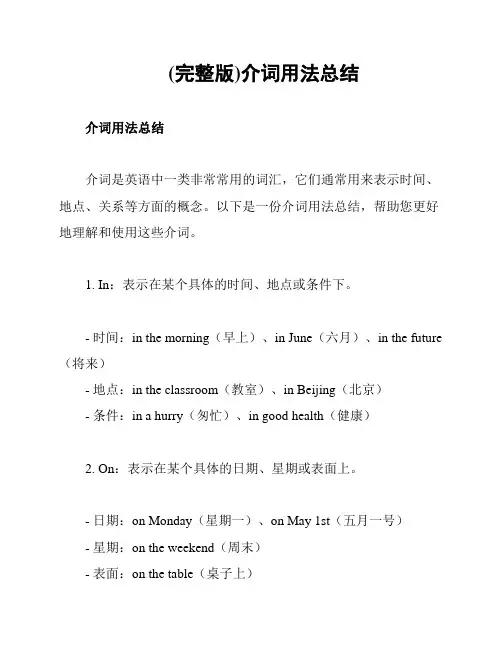
(完整版)介词用法总结介词用法总结介词是英语中一类非常常用的词汇,它们通常用来表示时间、地点、关系等方面的概念。
以下是一份介词用法总结,帮助您更好地理解和使用这些介词。
1. In:表示在某个具体的时间、地点或条件下。
- 时间:in the morning(早上)、in June(六月)、in the future (将来)- 地点:in the classroom(教室)、in Beijing(北京)- 条件:in a hurry(匆忙)、in good health(健康)2. On:表示在某个具体的日期、星期或表面上。
- 日期:on Monday(星期一)、on May 1st(五月一号)- 星期:on the weekend(周末)- 表面:on the table(桌子上)3. At:表示在某个具体的时间、地点或时刻。
- 时间:at 3 o'clock(三点钟)、at night(晚上)- 地点:at the park(公园)- 时刻:at the moment(此刻)4. By:表示通过某种方式或由某人完成某事。
- 方式:go to work by car(坐车上班)- 人:the book written by Mark Twain(马克·吐温所写的书)5. With:表示陪同、具备、使用等概念。
- 陪同:go shopping with friends(和朋友一起去购物)- 具备:a house with a garden(带有花园的房子)- 使用:write with a pen(用钢笔写)6. For:表示为了某个目的、期间或持续时间。
- 目的:study for the test(为考试研究)- 期间:wait for a while(等一会儿)- 持续时间:sleep for eight hours(睡八个小时)以上是介词的基本用法总结,希望对您有所帮助!。
介词的用法总结大全
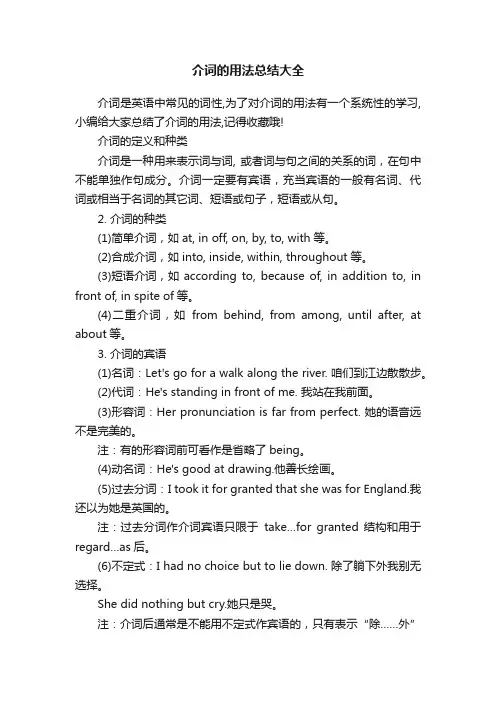
介词的用法总结大全介词是英语中常见的词性,为了对介词的用法有一个系统性的学习,小编给大家总结了介词的用法,记得收藏哦!介词的定义和种类介词是一种用来表示词与词, 或者词与句之间的关系的词,在句中不能单独作句成分。
介词一定要有宾语,充当宾语的一般有名词、代词或相当于名词的其它词、短语或句子,短语或从句。
2. 介词的种类(1)简单介词,如at, in off, on, by, to, with等。
(2)合成介词,如into, inside, within, throughout等。
(3)短语介词,如according to, because of, in addition to, in front of, in spite of等。
(4)二重介词,如from behind, from among, until after, at about等。
3. 介词的宾语(1)名词:Let's go for a walk along the river. 咱们到江边散散步。
(2)代词:He's standing in front of me. 我站在我前面。
(3)形容词:Her pronunciation is far from perfect. 她的语音远不是完美的。
注:有的形容词前可看作是省略了being。
(4)动名词:He's good at drawing.他善长绘画。
(5)过去分词:I took it for granted that she was for England.我还以为她是英国的。
注:过去分词作介词宾语只限于take…for gra nted 结构和用于regard…as后。
(6)不定式:I had no choice but to lie down. 除了躺下外我别无选择。
She did nothing but cry.她只是哭。
注:介词后通常是不能用不定式作宾语的,只有表示“除……外”的 but, except 等个别介词能接不定式作宾语。
史上超全的英语介词用法归纳总结!不看太可惜了
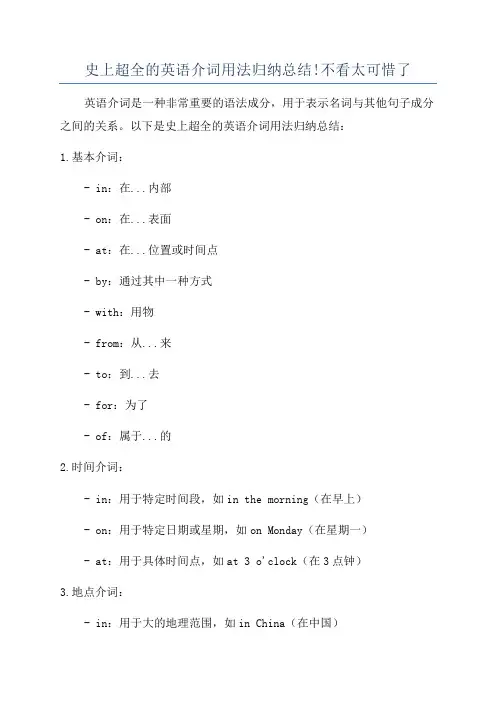
史上超全的英语介词用法归纳总结!不看太可惜了英语介词是一种非常重要的语法成分,用于表示名词与其他句子成分之间的关系。
以下是史上超全的英语介词用法归纳总结:1.基本介词:- in:在...内部- on:在...表面- at:在...位置或时间点- by:通过其中一种方式- with:用物- from:从...来- to:到...去- for:为了- of:属于...的2.时间介词:- in:用于特定时间段,如in the morning(在早上)- on:用于特定日期或星期,如on Monday(在星期一)- at:用于具体时间点,如at 3 o'clock(在3点钟)3.地点介词:- in:用于大的地理范围,如in China(在中国)- on:用于较小的地理范围或表面,如on the street(在街上)- at:用于具体地点,如at the supermarket(在超市)4.方向介词:- to:表示到达一些地方,如go to school(去学校)- into:表示进入一些地方,如go into the house(进入房子)- out of:表示离开一些地方,如get out of the car(离开车)5.原因介词:- because of:由于,如He is late because of the traffic(他因为交通堵塞而迟到)- due to:由于,如The flight was canceled due to bad weather(因为恶劣天气,航班被取消)6.动词短语介词:- look after:照顾,如She looks after her younger brother (她照顾她的弟弟)- take care of:照顾,如He takes care of his plants(他照顾他的植物)7.形容词短语介词:- interested in:对...感兴趣,如She is interested in music (她对音乐感兴趣)- good at:擅长...,如He is good at playing basketball(他擅长打篮球)8.其他常见介词用法:- with regard to:关于,如With regard to the matter, I have something to say(关于这件事,我有些话要说)- instead of:代替,如I will go instead of him(我将代替他去)- according to:根据,如According to the weather forecast, it will rain tomorrow(根据天气预报,明天会下雨)以上是一些常见的英语介词用法总结,希望能帮到你!。
英语介词的用法总结(完整版)
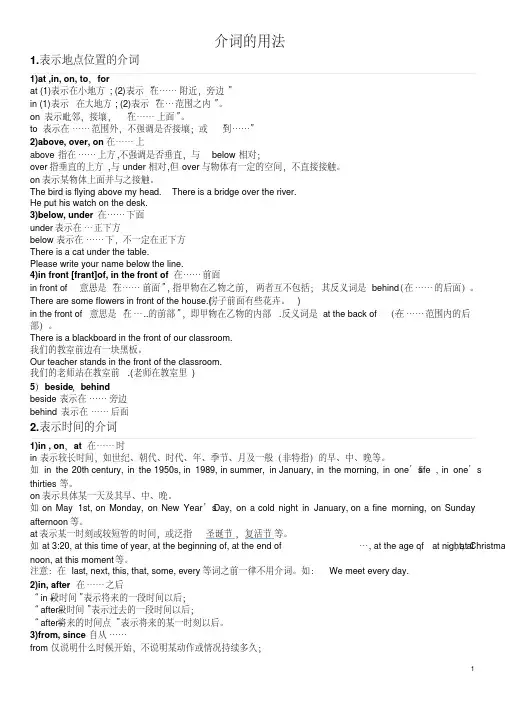
介词的用法1.表示地点位置的介词1)at ,in, on, to,forat (1)表示在小地方; (2)表示“在……附近,旁边”in (1)表示在大地方; (2)表示“在…范围之内”。
on 表示毗邻,接壤,“在……上面”。
to 表示在……范围外,不强调是否接壤;或“到……”2)above, over, on 在……上above 指在……上方,不强调是否垂直,与below相对;over指垂直的上方,与under相对,但over与物体有一定的空间,不直接接触。
on表示某物体上面并与之接触。
The bird is flying above my head. There is a bridge over the river.He put his watch on the desk.3)below, under 在……下面under表示在…正下方below表示在……下,不一定在正下方There is a cat under the table.Please write your name below the line.4)in front [frant]of, in the front of在……前面意思是“在……前面”,指甲物在乙物之前,两者互不包括;其反义词是behind(在……的后面)。
in front of…There are some flowers in front of the house.(房子前面有些花卉。
)in the front of 意思是“在…..的前部”,即甲物在乙物的内部.反义词是at the back of…(在……范围内的后部)。
There is a blackboard in the front of our classroom.我们的教室前边有一块黑板。
Our teacher stands in the front of the classroom.我们的老师站在教室前.(老师在教室里)5)beside,behindbeside 表示在……旁边behind 表示在……后面2.表示时间的介词1)in , on,at 在……时in表示较长时间,如世纪、朝代、时代、年、季节、月及一般(非特指)的早、中、晚等。
英语介词知识点归纳

英语介词知识点归纳1. In: 用于表示在一些位置或范围内。
例如:in the park, in the house.2. On: 用于表示在一些表面上。
例如:on the table, on the wall.3. At: 用于表示在一些地点。
例如:at the bus stop, at the park.5. To: 表示目的地。
例如:to the beach, to the park.6. By: 表示交通工具或方式。
例如:by train, by bus.7. With: 表示伴随或使用。
例如:with my friend, with a pen.8. For: 表示目的或用途。
例如:for a party, for studying.9. About: 表示关于一些主题。
例如:about the movie, about the book.10. Over: 表示在一些区域上方。
例如:over the bridge, overthe sky.11. Under: 表示在一些区域下方。
例如:under the table, under the bed.12. Through: 穿过一些空间或经历一些过程。
例如:through the door, through the forest.13. Withou: 表示没有一些东西或情况。
例如:without a hat, without a doubt.14. Above: 表示在物之上。
例如:above the clouds, above the sign.15. Below: 表示在物之下。
例如:below the surface, below the line.。
英语介词的用法归纳
英语介词的用法归纳英语介词是连接词汇与词汇,短语与短语之间,在句子中起到连接作用的词类。
它们用来确定词与词、短语与短语之间的关系,并表示时间、空间、原因、目的、手段、方式等等。
英语语法中常见的介词有约40多个,下面将对常见的英语介词进行归纳总结,以供参考。
一、表示时间的介词:1. at:表示具体的时间点,通常与表示时间的名词连用;也可表示某些特定的固定日、节日或场所。
例句:at 6 o'clock, at sunrise, at school2. in:表示较长的时间段、季节、月份、年、部门和地方等。
例句:in summer, in 2019, in London3. on:表示具体的某一天或某一天的上午/下午/晚上等。
例句:on Monday, on the morning of May 1st4. by:表示“最晚”、“到”的意思,通常表示某个时间点之前。
例句:by 10 o'clock, by the end of the year5. for:表示持续的时间段,通常与表示时间的名词连用。
例句:for three hours, for a week二、表示空间的介词:1. in:表示在某个或某些三维空间范围之内,也可表示在某个具体的区域或地点。
例句:in the room, in the park2. on:表示在某个平面面上,通常用来表示地点。
例句:on the table, on the wall3. at:表示在某个具体的地点或位置。
例句:at the door, at the bus stop4. by:表示“靠近”、“经过”等含义。
例句:by the river, by the window5. between:表示在两个或两个以上的物体或位置之间。
例句:between two mountains, between the buildings6. among:表示在三个或三个以上的物体或位置之间。
40个英语介词用法总结
40个英语介词用法总结1. At: 表示时间、位置或状态,例如at 3 o"clock, at the park, at peace.2. In: 表示时间、位置或状态,例如in May, in the room, in trouble.3. On: 表示日期、时间、表面或状态,例如on Monday, on the table, on fire.4. By: 表示手段、方法或时间,例如by train, by email, by noon.5. For: 表示目的、受益者或时间期限,例如for fun, for him, for two weeks.6. To: 表示方向、目的地或比较,例如to school, to London, to me.7. From: 表示起点、来源或分离,例如from home, from China, from each other.8. Into: 表示进入、转化或改变,例如into the house,into a pumpkin, into a butterfly.9. Out of: 表示脱离、从中取出或缺乏,例如out of the room, out of money, out of the blue.10. With: 表示伴随、附带或具备,例如with friends, witha smile, with experience.11. Without: 表示没有、不带或缺少,例如withoutpermission, without shoes, without doubt.12. Over: 表示覆盖、超过或结束,例如over the roof, over the limit, over and done with.13. Under: 表示在下面、被支配或不足,例如under the table, under his control, under budget.14. About: 表示关于、大约或忙于,例如about the movie, about 10 dollars, about to leave.15. Above: 表示在上面、高于或超过,例如above the clouds, above average, above suspicion.16. Below: 表示在下面、低于或不足,例如below the surface, below freezing, below par.17. Across: 表示横穿、相交或涉及,例如across the street, across the board, across his mind.18. Beyond: 表示超出、远离或除了,例如beyond repair, beyond belief, beyond her control.19. Around: 表示周围、附近或环绕,例如around the corner, around the clock, around the world.20. Before: 表示以前、在前面或比较,例如before noon, before the house, before his time.21. Behind: 表示在后面、落后或背后,例如behind the house, behind schedule, behind the scenes.22. Beside: 表示在旁边、与...相比或附加,例如besidethe river, beside myself, beside the point.23. Inside: 表示内部、在里面或被包含,例如inside the box, inside the building, inside information.24. Outside: 表示外部、在外面或超出,例如outside the house, outside the box, outside the norm.25. Through: 表示穿过、经过或完成,例如through the door, through the park, through with it.26. Throughout: 表示遍布、贯穿或在整个期间,例如throughout the city, throughout history, throughout the day.27. Towards: 表示朝向、对于或接近,例如towards the sun, towards him, towards the end.28. Against: 表示反对、抵抗或紧挨着,例如against the law, against the current, against the wall.29. Among: 表示在...之中、相互之间或被分配到,例如among friends, among the stars, among the winners.30. Between: 表示在两者之间、在中间或相互之间,例如between two trees, between classes, between you and me.31. Within: 表示在内部、在范围之内或在规定时间内,例如within the house, within the budget, within a week.32. Without: 表示在外面、没有或不用,例如without the room, without a doubt, without further ado.33. Beneath: 表示在下面、低于或不足,例如beneath the surface, beneath his dignity, beneath contempt.34. Beside: 表示在旁边、与...相比或附加,例如beside the river, beside myself, beside the point.35. Into: 表示进入、转化或改变,例如into the house, into a pumpkin, into a butterfly.36. Upon: 表示在...之上、一旦发生或基于,例如upon the hill, upon arrival, upon further consideration.37. With: 表示伴随、附带或具备,例如with friends, witha smile, with experience.38. Within: 表示在内部、在范围之内或在规定时间内,例如within the house, within the budget, within a week.39. Without: 表示没有、不带或缺少,例如without permission, without shoes, without doubt.40. Beneath: 表示在下面、低于或不足,例如beneath the surface, beneath his dignity, beneath contempt.。
英语介词用法整理总结(超全面)
英语考试重点介词整理总结(超全面)1.O n 在……之上(在表面)●表示位置●表示在……上面●表示支撑raise himself onhis elbows平板支撑●表示随身carry money on me●表示广播on the radio●表示事件on the topic●词组●n.●give an opinion●On the point of●on all side●on top of●on fire●on foot●v.●agree on●go on for●call on●feed on●turn on●adj./adv.●be keen on●be hard on●习语●come on●on end●on earth●on the contrary●on purpose2.I n 在……里面●含义●表示位置●表示在作品中is the book●表示时间段●在状态in the trouble●表示方式in English , in print●表示穿着in a suit●词组●n.●arm in arm●a case in point一个典型的例子●in a hurry●in detail●in turn●in spite of●v.●abound in●get in touch with●keep in touch●adj/adv.●be abound in●be absorbed in专心致力于……3.A t 在(一个点)●含义●表示地点/场所●在旁边at the table●表示距离at certain distance, at an angle●表示时刻at 3am.●表示年龄at the age of 17●词组●at bottom●glance at●run out of 达到(某数字)●feel amused at●not at all4.o f 属于……的●含义●表示特征the aim of the course●表示从属特点Bank of China●表示数量a piece of paper●表示动作building of house●词组●n.●take advantage of●back of●take care of●v.●accuse sb. ofsth.●consist of●die of●adj./adv.●ahead of●be afraid of●be full of5.f or 为了●6.b y 依靠●含义●表示人He was brought up by his father.●表示手段by car●表示巧合I met by chance.碰运气。
介词常见11个用法归纳
介词常见11个用法归纳介词是连接词语与其他词语或词组的一种词类。
以下是介词的常见用法归纳:1. 表示地点:at, in, on例如:at school(在学校)、in the park(在公园)、on the table(在桌子上)2. 表示方向:to例如:go to the library(去图书馆)3. 表示时间:at, in, on例如:at 9 o'clock(在9点)、in July(在七月)、on Monday(在星期一)4. 表示原因:because of, due to例如:He failed the test because of his laziness(他因为懒惰而考试不及格)5. 表示目的:for例如:I bought some flowers for my mother(我买了些花给我妈妈)6. 表示手段或方式:by, with例如:She traveled to Paris by plane(她乘飞机去巴黎)7. 表示比较:than例如:He is taller than his sister(他比他姐姐高)8. 表示身份或性质:as例如:He works as a doctor(他是个医生)9. 表示关系:of例如:a book of poems(一个诗集)10. 表示来源:from例如:I received a gift from my friend(我收到了一份来自朋友的礼物)11. 表示递进或对比:besides, but, except, apart from例如:She likes all kinds of food, besides seafood(她喜欢各种食物,除了海鲜)。
- 1、下载文档前请自行甄别文档内容的完整性,平台不提供额外的编辑、内容补充、找答案等附加服务。
- 2、"仅部分预览"的文档,不可在线预览部分如存在完整性等问题,可反馈申请退款(可完整预览的文档不适用该条件!)。
- 3、如文档侵犯您的权益,请联系客服反馈,我们会尽快为您处理(人工客服工作时间:9:00-18:30)。
超全的英语介词用法归纳总结常用介词基本用法辨析
表示方位的介词:in, to, on
1. in 表示在某地范围之内。
Shanghai is/lies in the east of China. 上海在中国的东部。
2. to 表示在某地范围之外。
Japan is/lies to the east of China. 日本位于中国的东面。
3. on 表示与某地相邻或接壤。
Mongolia is/lies on the north of China. 蒙古国位于中国北边。
表示计量的介词:at, for, by
1. at 表示“以……速度”“以……价格”。
It flies at about 900 kilometers an hour. 它以每小时900公里的速度飞行。
I sold my car at a high price. 我以高价出售了我的汽车。
2. for 表示“用……交换,以……为代价”。
He sold his car for 500 dollars. 他以五百元把车卖了。
注意:at表示单价(price) ,for表示总钱数。
3. by 表示“以……计”,后跟度量单位。
They paid him by the month. 他们按月给他计酬。
Here eggs are sold by weight. 在这里鸡蛋是按重量卖的。
表示材料的介词:of, from, in
1. of 成品仍可看出原料。
This box is made of paper. 这个盒子是纸做的。
2. from 成品已看不出原料。
Wine is made from grapes. 葡萄酒是葡萄酿成的。
3. in 表示用某种材料或语言。
Please fill in the form in pencil first. 请先用铅笔填写这个表格。
They talk in English. 他们用英语交谈。
表示工具或手段的介词:by, with, on
1. by 用某种方式,多用于交通。
I went there by bus. 我坐公共汽车去那儿。
2. with表示“用某种工具”。
He broke the window with a stone. 他用石头把玻璃砸坏了。
注意:with表示用某种工具时,必须用冠词或物主代词。
3. on 表示“以……方式”,多用于固定词组。
They talked on the telephone. 他们通过电话进行交谈。
She learns English on the radio/on TV. 她通过收音机/电视学英语。
表示关于的介词:of, about, on
1. of 仅是提到或谈到过某人或某事。
He spoke of the film the other day. 他前几天提到了这部影片。
2. about 指“关于”某人或某事物的较详细的情况。
Can you tell me something about yourself? 你能告诉我关于你自己的事情吗?
3. on 指“关于”学术性的或严肃的事。
It’s a textbook on the history of china. 它是一本有关中国历史的教科书。
表原因或理由的介词:for, at, from, of, with, by, because of
1. for 表示原因,与sorry, famous, punish, praise, thank, blame连用。
I am sorry for what I said to you. 我后悔不该对你讲那些话。
2. at 指情感变化的原因,意为“因听到或看到而……”。
He was surprised at the news. 听到这消息他大吃一惊。
3. from 指“外在的原因”,如受伤、车祸等。
He died from the wound. 他因受伤而致死。
4. of 指“内在的原因”,如病、饿等。
The old man died of hunger. 老人死于饥饿。
5. with 指生理上或情感上的由外界到内心的原因。
Hearing the news, he jumped with joy. 他们听到这个消息,欣喜若狂。
He was shaking with anger. 他气得浑身发抖。
6. by 表示外部的,尤其是暴力的或无意中造成某种结果的原因。
Her body was bent by age. 他因年老背弯了。
She took your umbrella by mistake. 我因弄错拿了你的雨伞。
7. because of 表示引起结果的直接原因。
He retired last month because of illness/because he ill.
8. owing to 多表示引起某不良后果的原因。
Owing to the rain they could not come. 由于下雨他们没来。
9. thanks to 表示引起某种幸运结果的原因,常译为“幸亏……,多亏……”。
Thanks to John, we won the game. 多亏约翰,我们才赢了这场比赛。
10. out of 表示动机的起因,常译为“出于……”。
He asked the question out of curiosity. 他出于好奇才问了那个问题。
11. through 多表示因局部而影响全局的原因。
The war was lost through bad organization. 战争因组织不周而失败了。
表示好像或当作的介词:like, as
1. like表示“像……一样”,其实不是。
Peter the Great, like his country, was strong and proud. 彼得大帝像他的国家一样强健和自豪。
2. as表示“作为,以……身份”,其实也是。
He talked to me as a father. 他以父亲的身份跟我谈话。
注:as作连词时,可表示“好像……”。
The work is not so difficult as you imagine. 这工作不像你想像的那么困难。
表示支持或反对的介词:against, foragainst 反对,for支持,互为反义词。
Are you for my idea or against it? 你赞同还是反对我的想法?
表示除某人某物外的介词:besides, excep
1. besides是包括后面所提人或物在内的“除……外,还”。
Thirty students went to the cinema besides him. 除他以外,还有30个学生去看了电影(共计31人去)。
He is interested in tennis besides(=as well as)football.他对足球和网球都感兴趣。
2. except是指不包括后面所提人或物在内的“除去”。
Everyone is excited except me. 除我以外的每个人都很激动(我并不激动)。
All the visitors are Japanese except him. 除他以外的所有游客都是日本人。
(他不是日本人)
注意:(A) except通常与表示全体的all, every连用;若与other连用,只能用besides。
He had other people to take care of besides me. 除我之外,他还要照顾别人。
(B) except是排除同类;而except for是排除非同类,常在说明基本情况后,从细节上加上修正。
The composition is very good except for a few spelling mistakes. 除了几处拼写错误之外,这篇作文整体还是不错的。
(作文与拼写错误是非同类的)但except for 有时也可代替except,特别是在句首时,因为except 是不能用于句首的。
Except for George, you can all go. 除乔治外,你们都可以去。
